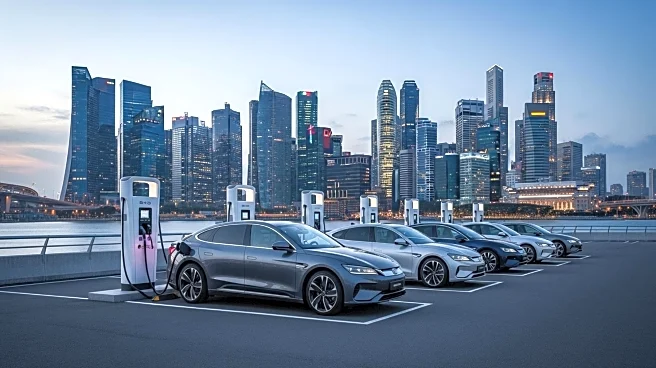What is the story about?
What's Happening?
BYD, a leading electric vehicle manufacturer, has dispatched its eighth Ro-Ro (roll on-roll off) car carrier ship from Shenzhen, China, to Singapore, carrying over 6,000 vehicles. This shipment is significant as it matches the total number of vehicles BYD sold in Singapore in 2024, making it the largest automaker in the country, surpassing Toyota. In the first half of 2025, BYD sold 4,667 vehicles, marking an 80.4% year-over-year increase. The company is also expanding its presence in the commercial vehicle sector with contracts for autonomous buses. Singapore's policies supporting electrification, such as high taxes on internal combustion engine vehicles and rebates for electric vehicles, have facilitated BYD's growth in the market.
Why It's Important?
BYD's expansion in Singapore underscores the city-state's commitment to electrification and its potential to influence Southeast Asia's automotive market. The company's dominance in both personal and commercial vehicle sectors highlights the effectiveness of Singapore's policies in promoting electric vehicles. This development could accelerate the region's transition to sustainable transportation, setting a precedent for other countries. The shift away from internal combustion engines, supported by government incentives, positions Singapore as a leader in environmental sustainability, potentially influencing policy decisions across Southeast Asia.
What's Next?
As Singapore continues to phase out incentives for electric vehicles by 2030, the market dynamics may shift, potentially affecting BYD's strategy. The reduction in rebates and the eventual ban on internal combustion engine vehicles will likely increase the demand for electric vehicles in the short term. BYD's continued investment in green shipping corridors and autonomous vehicle technology could further solidify its market position. Stakeholders, including policymakers and automotive companies, will be closely monitoring these developments to adapt their strategies accordingly.
Beyond the Headlines
The rapid adoption of electric vehicles in Singapore could have broader implications for urban planning and infrastructure development. The shift towards electrification may necessitate enhancements in charging infrastructure and energy grid capacity. Additionally, the success of BYD in Singapore could encourage other automakers to increase their focus on electric vehicles, potentially leading to increased competition and innovation in the sector. The cultural shift towards sustainable transportation may also influence consumer behavior and expectations in other markets.














